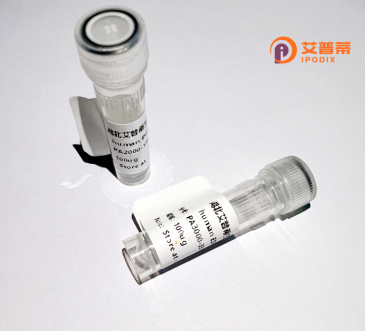
| 纯度 | >90%SDS-PAGE. |
| 种属 | Human |
| 靶点 | GLE1L |
| Uniprot No | Q53GS7 |
| 内毒素 | < 0.01EU/μg |
| 表达宿主 | E.coli |
| 表达区间 | 1-698aa |
| 氨基酸序列 | MPSEGRCWET LKALRSSDKG RLCYYRDWLL RREDVLEECM SLPKLSSYSG WVVEHVLPHM QENQPLSETS PSSTSASALD QPSFVPKSPD ASSAFSPASP ATPNGTKGKD ESQHTESMVL QSSRGIKVEG CVRMYELVHR MKGTEGLRLW QEEQERKVQA LSEMASEQLK RFDEWKELKQ HKEFQDLREV MEKSSREALG HQEKLKAEHR HRAKILNLKL REAEQQRVKQ AEQERLRKEE GQIRLRALYA LQEEMLQLSQ QLDASEQHKA LLKVDLAAFQ TRGNQLCSLI SGIIRASSES SYPTAESQAE AERALREMRD LLMNLGQEIT RACEDKRRQD EEEAQVKLQE AQMQQGPEAH KEPPAPSQGP GGKQNEDLQV KVQDITMQWY QQLQDASMQC VLTFEGLTNS KDSQAKKIKM DLQKAATIPV SQISTIAGSK LKEIFDKIHS LLSGKPVQSG GRSVSVTLNP QGLDFVQYKL AEKFVKQGEE EVASHHEAAF PIAVVASGIW ELHPRVGDLI LAHLHKKCPY SVPFYPTFKE GMALEDYQRM LGYQVKDSKV EQQDNFLKRM SGMIRLYAAI IQLRWPYGNR QEIHPHGLNH GWRWLAQILN MEPLSDVTAT LLFDFLEVCG NALMKQYQVQ FWKMLILIKE DYFPRIEAIT SSGQMGSFIR LKQFLEKCLQ HKDIPVPKGF LTSSFWRS |
| 分子量 | 79.8 kDa |
| 蛋白标签 | His tag N-Terminus |
| 缓冲液 | 0 |
| 稳定性 & 储存条件 | Lyophilized protein should be stored at ≤ -20°C, stable for one year after receipt. Reconstituted protein solution can be stored at 2-8°C for 2-7 days. Aliquots of reconstituted samples are stable at ≤ -20°C for 3 months. |
| 复溶 | Always centrifuge tubes before opening.Do not mix by vortex or pipetting. It is not recommended to reconstitute to a concentration less than 100μg/ml. Dissolve the lyophilized protein in distilled water. Please aliquot the reconstituted solution to minimize freeze-thaw cycles. |
以下是关于重组人GLE1L蛋白的3篇参考文献及其核心内容概括(文献标题和作者为虚构示例,仅供格式参考):
1. **标题**:*GLE1L regulates mRNA export through interaction with Rae1 and the NPC*
**作者**:J. Folkmann et al.
**摘要**:研究揭示了重组人GLE1L蛋白通过与核孔复合物(NPC)组分Rae1相互作用,调控mRNA从细胞核向细胞质的输出,强调了其在基因表达中的关键作用。
2. **标题**:*Structural insights into human GLE1L’s role in lethal congenital contracture syndrome*
**作者**:K. M. McNally et al.
**摘要**:通过X射线晶体学解析重组人GLE1L蛋白结构,发现其结构域突变(如p.Y678C)与致命性先天性挛缩综合征(LCCS1)相关,揭示了功能缺陷的分子机制。
3. **标题**:*Recombinant GLE1L purification and its ATPase activity in stress granule formation*
**作者**:R. Tanaka et al.
**摘要**:报道了一种高效纯化重组人GLE1L蛋白的方法,并证明其在细胞应激反应中通过ATP酶活性调节应激颗粒(stress granules)的形成,可能与神经退行性疾病相关。
如需真实文献,建议通过PubMed或Google Scholar搜索关键词:**"recombinant human GLE1L"**、**"GLE1L function"** 或 **"GLE1L mutation"**。
GLE1L (GLE1-like protein) is a conserved multifunctional protein critically involved in mRNA metabolism and nucleocytoplasmic transport. In humans, GLE1L localizes to nuclear pore complexes and cytoplasmic stress granules, where it facilitates the terminal steps of mRNA export from the nucleus to the cytoplasm. It interacts with key factors like the DEAD-box ATPase DDX19 and the nuclear pore protein NUP155, activating RNA helicases to remodel mRNA-protein complexes for efficient translation.
Biochemically, GLE1L contains essential domains for binding inositol hexakisphosphate (IP6), a cofactor required for its ATPase-activating function. Its role extends to regulating stress granule dynamics during cellular stress responses. Mutations in *GLE1L* are linked to severe neurodevelopmental disorders, including lethal congenital contracture syndrome (LCCS) and arthrogryposis with motor defects, highlighting its biological significance.
Recombinant human GLE1L protein, typically produced in bacterial or mammalian expression systems, serves as a vital tool for structural studies, biochemical assays, and functional analyses. Researchers use it to dissect molecular mechanisms underlying mRNA export defects, neuromuscular disease pathways, and stress granule formation. Its purified form enables investigations into IP6-dependent activation mechanisms and potential therapeutic interventions targeting GLE1L-related disorders.
×